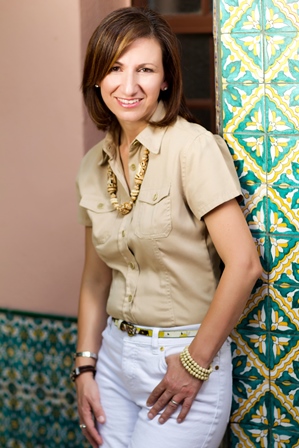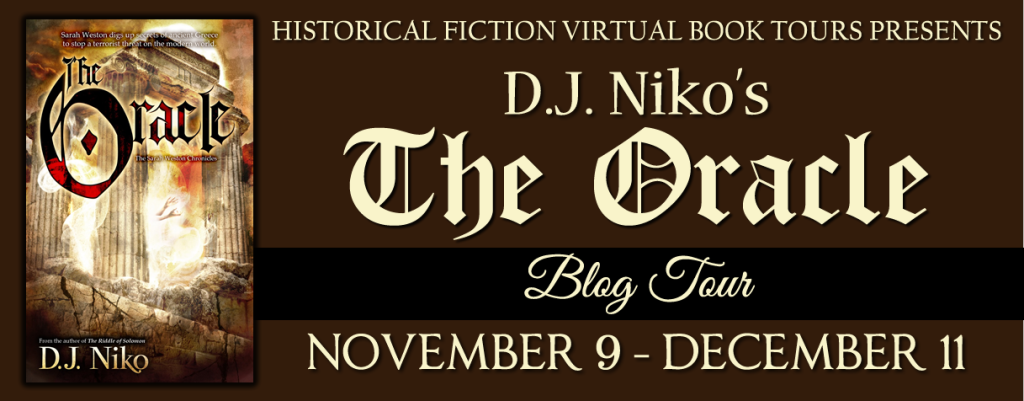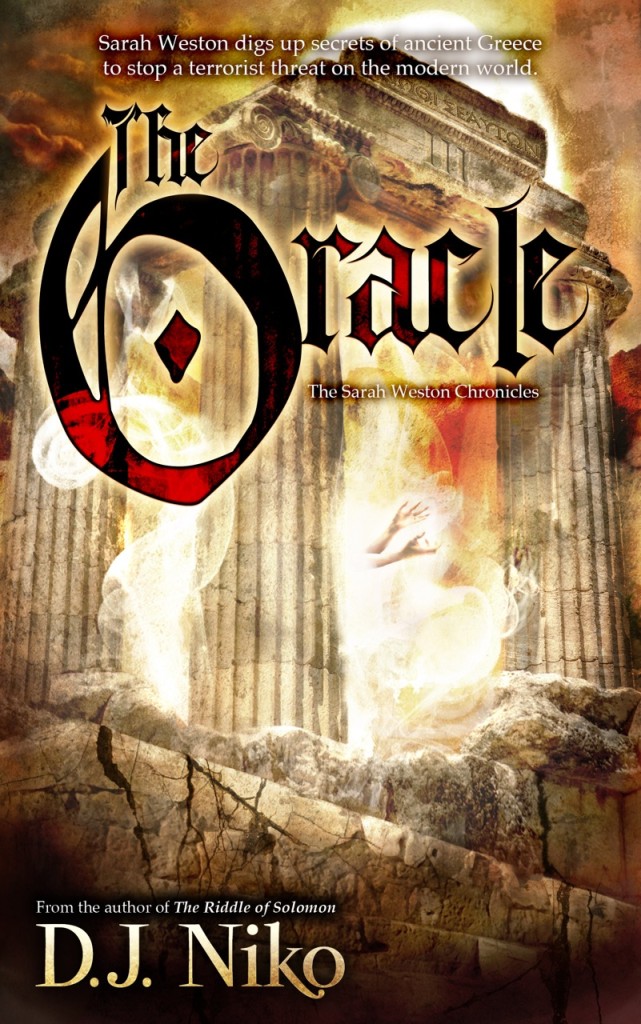The Oracle (The Sarah Weston Chronicles, Book Three) by D.J Niko
Publication Date: November 10, 2015 Medallion Press Paperback; 456p ISBN-13: 978-1605426273 Genre: Historical/Archaeological AdventureIn Delphi, the mountain city deemed by the Greek gods to be the center of the Earth, a cult of neo-pagans re-create with painstaking authenticity ancient rituals to glorify the god Apollo and deliver oracles to seekers from around the world. When antiquities are stolen from a museum in nearby Thebes, British archaeologist Sarah Weston and her American partner, Daniel Madigan, are drawn into a plot that goes beyond harmless role-playing: someone’s using the Delphian oracle as a smoke screen for an information exchange, with devastating consequences for the Western world. Pitted against each other by the cult’s mastermind, Sarah and Daniel race against time and their own personal demons to uncover clues left behind by the ancients. Their mission: to find the original navel stone marked with a lost Pythagorean formula detailing the natural events that led to the collapse of the Minoan Empire. But will they find it in time to stop the ultimate terrorist act?
AMAZON | BARNES & NOBLE | BOOK DEPOSITORY | INDIE BOUND
Guest Post
The
Perils of Writing What You Know Too Well
By
D.J. Niko
Every time I gear up for the release of
one of my novels, I hold my breath. I don’t know if this happens to every
writer, but it sure happens to me. Four books into my career, I still think:
What will the critics say? Will anyone buy it? Will the reviews be glowing,
scathing, or, worst of all, lukewarm?
The feeling is amplified when the book’s
subject is something I am particularly close to. This month’s release, The Oracle, is one such instance. It is
set in Greece, where I was born and raised, and delves into both the ancient
history and the current state of this great nation. I’d always known I wanted
to write a Greek setting, yet I’d hesitated, waiting to build up storytelling
experience—or, perhaps, nerve. Since The Oracle was the third book in my Sarah
Weston Chronicles series of archaeo-historical thrillers, I took a deep breath
and told myself it was time.
The widely accepted “write what you know”
logic might dictate that this was the easiest book for me to write. In fact, it
was the opposite. I can’t tell you how many plot lines I scrapped and started
over, each time sweating my looming deadline. I even had full-blown anxiety
attacks—twice.
While writing what you know is a good
policy, writing what you know too well is fraught with peril. It demands that
you dredge up your deepest emotions, let go of long-held biases, and be
unafraid of telling it like it is, even if you might be judged for it. It’s
scary, anxiety-inducing stuff, but, if handled correctly, it can lead to some
of your best writing.
In my case, there were two imperatives: to
describe the settings with the authenticity one would rightly expect from a
native, and to give some insight into the culture, past and present, and into
the sociopolitical minefield of a nation bogged down by crisis and instability.
The first part: no sweat. The second was harder to nail, and the jury’s still
out as to whether or not I’ve managed that.
I’ll share an example. In the excerpt
below, I describe the scene in Omonia, which in my childhood was the commercial
and cultural hub of Athens but has since been blighted by neglect and crime. I
struggled with whether I should tell it like it is or avoid it altogether.
Writing is all about taking risks, of course, so I opted for the latter.
Sarah wandered the back
streets of Omonia, the square in the heart of downtown Athens. She needed time
to process what she’d just heard and a distraction to keep from doing something
she’d regret.
She
glanced furtively at the faces around her: Bangladeshi men, dressed in sarongs
and tank tops, chewing paan as they sat idly on stoops of shuttered buildings;
homeless waifs lying on filthy blankets on the sidewalk, staring vacantly at
passersby and on occasion summoning the energy to extend an open palm; an
emaciated young woman dressed in a cheap, skin-tight micromini, standing
against a corrugated metal construction wall, cigarette in hand, soliciting
business.
She
couldn’t believe how Omonia Square had changed in the years since she’d visited
Athens. Apart from the die-hard souvlaki stands and tobacco kiosks, businesses
had gone under, leaving behind boarded-up buildings that eventually became
magnets for posters and political graffiti. The apartments, once desirable real
estate, had been left to decay and converted to low-rent immigrant quarters,
many with no heat or running water. The Greeks had all fled to other
neighborhoods, handing the spiritual keys to their Omonia over to poor, jobless
foreign settlers—some legal, some not—and letting them turn this former hub
into a cesspool of debauchery.
Sarah
stopped by the temporary wall, behind which was an abandoned construction site
now strewn with garbage. She took a cigarette out of her jacket pocket and
fumbled for a lighter. The streetwalker walked up to her, offering a light.
Sarah accepted it, noting the multiple needle marks on the woman’s arms. She
met her gaze and realized she was probably no older than sixteen. The girl
flashed a smile, a heartbreaking playfulness in it. Sarah nodded her thanks and
walked on.
It’s a hundred percent accurate, yet it
was hard for me to write. But I’m glad I did it. There is a certain acceptance
that comes with committing something to paper and putting it out there for the
world to see.
Many scenes like this one unfold in The Oracle, and—I hope—enrich the
narrative. Though it cost me some sleep and tears, the decision to paint a true
portrait of Greece, for better or for worse, ultimately was a good one—if for
no one else, for me.
Truth is, after all, one of the paragons
of ancient Greek philosophy. As Plato said in his seminal work, The Republic, “When the mind’s eye rests
on objects illuminated by truth and reality, it understands and comprehends
them, and functions intelligently.” It’s sage advice for all of us.
The
Oracle is available this month from Medallion. For more
information, visit www.djnikobooks.com
or the author’s Facebook
page.
About the Author
 Daphne Nikolopoulos, photography by Lauren Lieberman / LILA Daphne Nikolopoulos in an award-winning journalist, author, editor, and lecturer. Under the pen name D.J. Niko, she has written two novels in an archaeological thriller series titled The Sarah Weston Chronicles. Her debut novel, The Tenth Saint (Medallion Press, 2012), won the Gold Medal (popular fiction) in the prestigious, juried Florida Book Awards. Her follow-up release, The Riddle of Solomon, continues the story of British archaeologist Sarah Weston as she seeks the relics—and mystical secrets—left behind by the biblical King Solomon in remote Israel.
Daphne is currently at work on The Oracle, book 3 in The Sarah Weston Chronicles, which releases in 2015. Also slated for publication in 2015 is her first historical novel, The Judgment, which is set in Israel and Egypt in the tenth century BCE.
In addition to writing fiction, Daphne is editor in chief of Palm Beach Illustrated magazine and editorial director of Palm Beach Media Group. Prior to that, she was a travel journalist who logged hundreds of thousands of miles traveling across the globe, with emphasis on little-known and off-the-beaten-path locales—many of which have inspired her novels.
Daphne frequently lectures about her research on the ancient world. She is an instructor at Florida Atlantic University’s Lifelong Learning Society, teaching on the subject of archaeology. She has also spoken to audiences at the Jewish Community Center of the Palm Beaches’ Academy for Continuous Education, and several libraries and private groups throughout Florida.
Born and raised in Athens, Greece, Daphne now resides in West Palm Beach with her husband and twin son and daughter.
Daphne Nikolopoulos, photography by Lauren Lieberman / LILA Daphne Nikolopoulos in an award-winning journalist, author, editor, and lecturer. Under the pen name D.J. Niko, she has written two novels in an archaeological thriller series titled The Sarah Weston Chronicles. Her debut novel, The Tenth Saint (Medallion Press, 2012), won the Gold Medal (popular fiction) in the prestigious, juried Florida Book Awards. Her follow-up release, The Riddle of Solomon, continues the story of British archaeologist Sarah Weston as she seeks the relics—and mystical secrets—left behind by the biblical King Solomon in remote Israel.
Daphne is currently at work on The Oracle, book 3 in The Sarah Weston Chronicles, which releases in 2015. Also slated for publication in 2015 is her first historical novel, The Judgment, which is set in Israel and Egypt in the tenth century BCE.
In addition to writing fiction, Daphne is editor in chief of Palm Beach Illustrated magazine and editorial director of Palm Beach Media Group. Prior to that, she was a travel journalist who logged hundreds of thousands of miles traveling across the globe, with emphasis on little-known and off-the-beaten-path locales—many of which have inspired her novels.
Daphne frequently lectures about her research on the ancient world. She is an instructor at Florida Atlantic University’s Lifelong Learning Society, teaching on the subject of archaeology. She has also spoken to audiences at the Jewish Community Center of the Palm Beaches’ Academy for Continuous Education, and several libraries and private groups throughout Florida.
Born and raised in Athens, Greece, Daphne now resides in West Palm Beach with her husband and twin son and daughter.You can find her on the Web at djnikobooks.com and connect with her on Facebook (AuthorDJNiko) and on Twitter: @djnikobooks.
Blog Tour Schedule
Monday, November 9 Review at A Book GeekTuesday, November 10 Guest Post at Historical Fiction Connection
Wednesday, November 11 Review at Back Porchervations
Friday, November 13 Spotlight at I'd So Rather Be Reading
Monday, November 16 Spotlight & Giveaway at Teddy Rose Book Reviews Plus More
Tuesday, November 17 Review at Book Nerd
Wednesday, November 18 Review at History From a Woman's Perspective Spotlight & Excerpt at The Lit Bitch
Thursday, November 19 Spotlight at A Literary Vacation
Friday, November 20 Spotlight at The Never-Ending Book
Monday, November 23 Character Interview at Boom Baby Reviews
Tuesday, November 24 Guest Post at Yelena Casale's Blog
Friday, November 27 Spotlight at Teatime and Books
Tuesday, December 1 Review at Kristin Un-Ravelle'd
Wednesday, December 2 Review at Book Lovers Paradise
Friday, December 4 Spotlight at Diana's Book Reviews
Thursday, December 10 Review at One Book Shy of a Full Shelf
Friday, December 11 Guest Post & Giveaway at One Book Shy of a Full Shelf Spotlight at CelticLady's Reviews



Thank you for this interesting guest post by D.J. Niko. As a reviewer of The Oracle, it's nice to read about author processes/thoughts of the book. I'm learning too that it's important to get the word out (reviews, small blurbs, etc. with images) into the Twitter and media spheres to those who will be interested (sometimes needs experimentation). All the best!
ReplyDelete